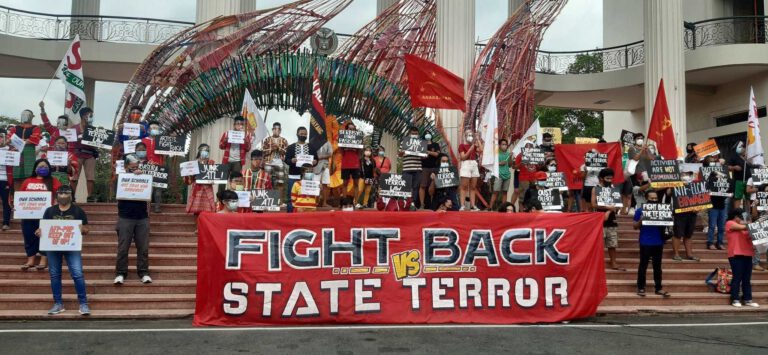
Christian Deiparine (Philstar.com) – January 19, 2021
MANILA, Philippines — Chancellors of different University of the Philippines campuses pushed back on the defense department’s termination of the accord barring state forces in their schools, urging government to rescind the widely criticized decision.
The DND’s move this week had been an apparent culmination of the Duterte administration’s repeated yet unproven claims that the state-run institutions are being used to recruit students to the armed communist movement.
Students earlier today trooped to the Diliman campus to protest the nixing of the decades-long accord, first signed in 1989, that prohibits military and police from entering their grounds without prior notification from university officials.
In a statement, UP Diliman Chancellor Fidel Nemenzo said the DND’s claim about communist recruitment in campuses need concrete proof and “are not grounds to cancel an agreement founded on a constitutional right,” adding that academic freedom may face threat with the accord ending.

“Academic freedom has allowed us to do what we do best: to nurture young minds to dream and think big for our country, to be mission-driven and service-oriented,” he said. “This is why we must defend, and will defend UP as a zone of free thought and free speech.”
He added: “This year we commemorate the 50th anniversary of the Diliman Commune; next year is the 50th anniversary of the imposition of martial rule. It is not the time to forget.”
Several lawmakers who graduated from UP have since aired their opposition on the move, with members of the upper chamber formalizing their opposition through a resolution.
But it remains unclear if the DND would take back its decision, especially with the Palace saying it had the backing of President Rodrigo Duterte, who himself had said that the university is a breeding ground for communists.
In November last year, the president also threatened to defund UP on misguided claims that it was their students who called for an academic strike over government’s handling of recent typhoons that affected millions and left scores dead.
The Commission on Higher Education has also so far kept mum on the issue, despite its chairman Prospero de Vera III, who had taught in UP, sitting as the de facto chairman of the UP Board of Regents.
In UP Visayas, Chancellor Clement Camposano said cases of government troops involved in cases of human rights abuse “cannot but leave us unassured” that rights and freedoms would indeed be honored, as claimed.
“Historical events that have shaped the relationship of UP and the country’s security forces—many of these leaving wounds that have yet to heal—explain the university’s strong apprehension,” he said.
UP Cebu Chancellor Liza Corro cited too the intimidation, threats and red-tagging students had experienced, including the arrests made in June 2020 when police forcibly entered the campus despite the accord still in place then.
While in UP Los Baños in Laguna, Chancellor Jose Camacho Jr. described the abrogation as “an assault against the freedom of UP as an institution.”
He said that in the past, the university had cooperated with government on enforcing laws, hence the accord is not a hindrance to implementing order.
“As a bastion for the expression of ideas, ideals, and advocacies and as a sanctuary for the exercise of our cherished rights and freedoms, UP is hallowed ground for activism and dissent, not rebellion,” he said.
Nixing the agreement followed after the CPP-NPA was designated as a terrorist organization by the unelected Anti-Terrorism Council, formed under the highly controversial Anti-Terror Law which faces 37 petitions before the Supreme Court to strike it down as unconstitutional.
The deal, signed in 1989 between then UP President Jose Abueva and then defense chief Fidel Ramos, holds that military and police cannot enter any UP campus “except in cases of hot pursuit and similar occasions of emergency” or when assistance is requested by university officials.
Incumbent UP President Danilo Concepcion has since said that the scrapping of the pact is “unwarranted” and could only stir confusion and mistrust.